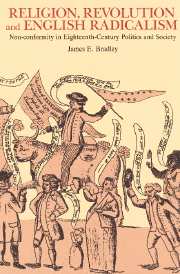 Religion, Revolution and English Radicalism
Religion, Revolution and English Radicalism Published online by Cambridge University Press: 29 October 2009
Signed petitions to the throne hold significant promise for the study of popular behavior and radical politics. The popular documents of the Middlesex election affair, the American crisis, and the Fox-North Coalition have recently been used to demonstrate that petitioning reached much deeper into the populace than parliamentary elections. Through a comparison of individual petitioners and voters it is now possible to show that in the eighteenth century, the ‘political nation’ embraced at least 425,000 people, more than a third greater than previous estimates. The petitions to the crown also show that the American crisis was a highly divisive issue. The English were far less enthusiastic about going to war with the colonies than most historians believed, and the common people were anything but politically apathetic. The American crisis divided more boroughs and counties than either the Middlesex election affair or parliamentary reform, and the petitions for peace suggest that the Revolution may have been one of England's least popular modern wars.
If the American Revolution divided England, and if it was, as the critics of the ministry claimed, a cruel civil war, the basis for this division must be sought in the attitudes of individuals toward authority and how their attitudes in turn were formed by social status and religious affiliation. The background of individual petitioners alone will provide answers to the causes of pro-Americanism.
To save this book to your Kindle, first ensure no-reply@cambridge.org is added to your Approved Personal Document E-mail List under your Personal Document Settings on the Manage Your Content and Devices page of your Amazon account. Then enter the ‘name’ part of your Kindle email address below. Find out more about saving to your Kindle.
Note you can select to save to either the @free.kindle.com or @kindle.com variations. ‘@free.kindle.com’ emails are free but can only be saved to your device when it is connected to wi-fi. ‘@kindle.com’ emails can be delivered even when you are not connected to wi-fi, but note that service fees apply.
Find out more about the Kindle Personal Document Service.
To save content items to your account, please confirm that you agree to abide by our usage policies. If this is the first time you use this feature, you will be asked to authorise Cambridge Core to connect with your account. Find out more about saving content to Dropbox.
To save content items to your account, please confirm that you agree to abide by our usage policies. If this is the first time you use this feature, you will be asked to authorise Cambridge Core to connect with your account. Find out more about saving content to Google Drive.